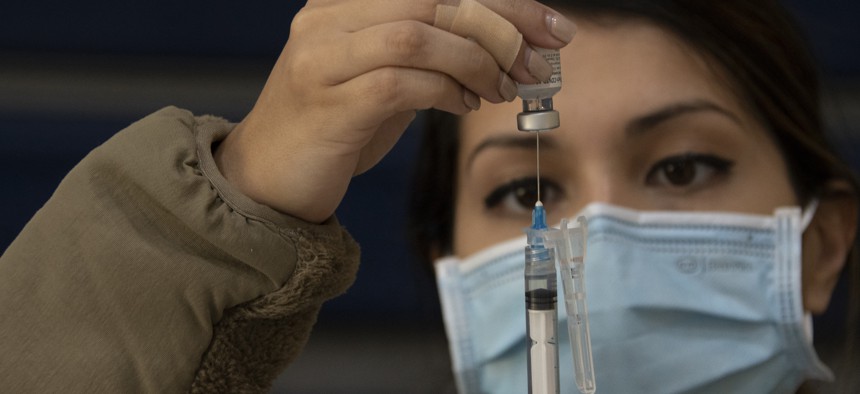
An airman prepares a syringe before administering a COVID-19 vaccination at Barksdale Air Force Base, La., Nov. 7, 2021. Air Force Senior Master Sgt. Ted Daigle
Denials, Not Approvals, Greet Troops’ Religious Vax Exemptions
No service has yet publicly announced that any service member has received a religion-based exemption from the Pentagon’s COVID-vaccination mandate.
The Air Force has rebuffed roughly 20 percent of the airmen who requested a religious exemption to the Pentagon’s COVID vaccine requirement, officials said Thursday. More than 10,000 Air Force and Space Force troops applied for a religious exemption, far more than any other service. Officials have denied 2,100 of the applications so far; it is not clear whether the rest will be approved or denied.
In fact, neither the Air Force nor any other service has publicly announced approval of any religious exemptions.
The Army received 1,746 requests for religious accommodation, has denied 85, approved zero, and is still processing the rest. The Navy has received 2,844 active-duty requests for religious accommodation and has approved zero. And the Marine Corps has received 3,192 requests for religious accommodation and has approved zero. The Marine Corps’ COVID-19 data shows that 3,080 requests have been processed but does not clarify whether that means they have been denied.

“Each request is individually reviewed by Religious Resolution Teams at the wing, garrison, major command and field command levels, which are made up of chaplains, medical providers, judge advocates, and other subject matter experts,” the Air Force’s Dec. 22 memo reads. “Religious Resolution Teams make recommendations on determining the least restrictive means possible to accommodate a sincerely held belief without putting mission accomplishment at risk.”
The Air Force set itself a Nov. 2 deadline to achieve full vaccination among its active-duty force—a more ambitious deadline than any other branch. When that deadline came and went, the branch was still processing more than 5,000 requests for religious exemption. Since then, the number of such requests has doubled.
“Each member’s request is carefully considered to balance the government’s compelling interest in mission accomplishment with the service member’s sincerely held belief,” said Air Force Undersecretary Gina Ortiz Jones in the memo. “Although the chaplain may advise the member’s belief is sincere,” the commanders of major and field commands “have to balance that member’s interests against the overall impact on operational readiness, health and safety of members and good order and discipline within the unit.”
The Air Force, like the rest of the Defense Department, has achieved an active-duty vaccination rate in the high 90s, but the in-depth review of religious exemptions continues to keep every branch short of 100%.
Airmen whose religion-based exemption requests are denied have five calendar days to begin a COVID-19 vaccination regimen, submit an appeal to the final appeal authority, or request to separate within five months of the denial if the airman’s service obligation allows.
“Service members who continue to refuse to obey a lawful order to receive the COVID-19 vaccine after their exemption request/final appeal has been denied or retirement/separation has not been approved will be subject to initiation of administrative discharge proceedings,” the memo reads.







